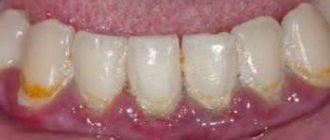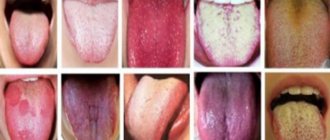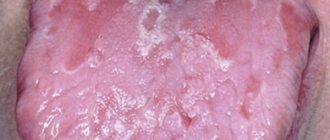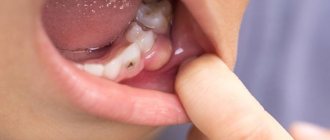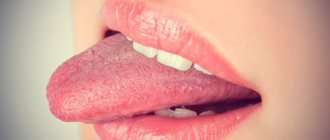Antibacterial drugs should not be taken without a doctor's prescription. They not only kill pathogens, but also inhibit beneficial intestinal microflora. Despite their undoubtedly beneficial properties, antibacterial drugs always disrupt the natural balance of microflora and have a large number of adverse effects. One of the most common is the formation of plaque on the tongue. Find out why your tongue turns brown after antibiotics and what to do if it happens.
What it is
A black coating on the tongue usually appears with severe damage to the digestive tract.
Moreover, the more complex the patient’s condition, the darker and denser the plaque. It most often forms on the surface of the tongue, but can also cover the teeth and the inner surface of the cheeks in a thick layer. The black and green coating can scare anyone. But before you panic, you should carefully analyze what you ate in the last 24 hours. After all, there is a whole list of foods, the consumption of which stains the tongue, lips and teeth black or dark. These products include, first of all, blueberries. Consuming activated charcoal can also temporarily turn your tongue black.
A black coating on the tongue of an adult can also appear in the presence of a disease such as acidosis. Acidosis disrupts the acid-base balance in the body. Those who eat little fresh vegetables and fruits, while leaning on flour and sweets, are susceptible to this disease. If the doctor confirms that the black plaque on the tongue and teeth is due to acidosis, it is necessary to cleanse the body of toxins.
Previously, it was believed that a black coating on the tongue indicates such a terrible disease as cholera.
Modern doctors do not support this statement, but are still inclined to believe that a black coating on the tongue appears most often with acidosis.
What is black plaque
A black coating on the tongue is the first sign that a pathological disease process is occurring in a sluggish form in a person’s body, requiring immediate attention to a specialist.
How to quickly remove plaque from your tongue
But as practice shows, the main reasons for the appearance of blackness are:
- poor oral hygiene
- foods containing dye (for example, chocolate, candy, blueberries);
- taking medications (activated carbon).
The disease occurs mainly in middle-aged or older men.
Reasons for appearance
There may be quite a few reasons why a patient has a black coating on his tongue. Let's consider the most likely of them:
- acidosis (disturbance of the acid-base balance in the human body);
- diseases of the pancreas, gall bladder and digestive organs;
- presence of cholera infection;
- development of acute infectious diseases;
- the appearance and reproduction of chromogenic fungus in the oral cavity.
Let's look at all these reasons in more detail.
Angina
A black coating on the tongue in the morning may indicate a sore throat, especially if the patient has a very high fever and there is an acute respiratory viral infection in the body. In this case, you need to consult a doctor so that he can establish the correct diagnosis and prescribe adequate treatment. If you have a sore throat, a black coating on the tongue does not require any separate treatment; after recovery, it will disappear on its own. During illness, oral hygiene procedures should be carried out very carefully, cleaning not only the teeth and gums, but also the tongue.
Acidosis
As a result of a change in the acid-base balance towards increasing acidity, the patient's tongue may have a black or dark coating. Only an experienced doctor can make a diagnosis based on clinical studies and tests. Therefore, if you are concerned about a dark coating on your tongue, you should consult a general practitioner, undergo an examination, and only then begin treatment.
Diseases of the digestive tract
If you have a black coating on your tongue, the reasons may be the development of diseases of the gastrointestinal tract, primarily the pancreas and gall bladder. Many patients complain that along with the plaque there is a bitterness in the mouth, although they have no problems with the stomach. In fact, the disease can occur in a latent form, without showing itself for the time being. At the first signs, you should consult a doctor and take a blood test to rule out the presence of serious pathologies of the gastrointestinal tract.
Antibiotics
A black coating on the tongue after antibiotics appears quite rarely and usually signals a weakened human immune system. After all, antibiotics are not taken on their own; they are prescribed only for serious indications. And, accordingly, such a patient’s immunity is weakened. Taking antibiotics is also associated with the risk of multiplying a fungal infection, and the development of chromogenic fungus in the oral cavity only increases the risk of black plaque formation.
In the morning
Dark plaque on the tongue and teeth in the morning is a fairly common phenomenon, since bacteria and microorganisms actively multiplied in the patient’s mouth overnight. It is extremely important to brush your teeth before going to bed, this way we reduce the number of pathogenic bacteria and prevent the appearance of dense plaque.
Thrush
Black coating on the tongue and thrush are not as closely related as they might seem. Most often, with thrush, a white coating appears, which is quite difficult to remove; soon it appears again and again. But if the disease is in an extremely advanced state, the coating on the tongue may darken and resemble black in color.
Bitterness in the mouth
A black coating on the tongue and bitterness in the mouth may indicate diseases of the pancreas and gall bladder. With these diseases, dehydration of the body often occurs, which is expressed in the appearance of bitterness in the mouth.
Sometimes patients ask why a black coating appears on the tongue if everything is fine with the digestive tract. We remind you that sometimes diseases occur in the so-called latent form, in which the patient is not even aware of the presence of the disease. And dark language should definitely alert you.
Chromogenic fungus
Black-green plaque may be the cause of chromogenic fungus in the oral cavity. In this case, plaque covers not only the patient’s tongue, but also his teeth and gums. Dark green spots appear on the surface of the tooth enamel. In this case, it is necessary to observe extremely careful oral hygiene.
Symptoms
Signs characterizing the appearance of blackness on the tongue:
- color - varies from green to gray, sometimes it can have whitish-yellow or brown shades;
- location - the entire surface of the organ, in the center, closer to the root, on the sides or at the tip;
- consistency of the substrate - it can be dry, wet, curdled and fatty;
- relief of the surface of the tongue;
- the presence of formations - for example, ulcers, pustules, pimples.
5 effective methods for treating plaque on teeth
A lot of information about the plaque is conveyed by the appearance and its shape. If the tongue has small black specks, then it says:
- about intoxication of the body;
- about chromogenic fungus in the mouth;
- about exacerbation of chronic diseases associated with the digestive organs.
In the latter case, the gums become black and a metallic taste is felt in the mouth.
Blackness in the form of a large dark spot is formed if in the body:
- have gastrointestinal ;
- there is an exacerbation of chronic diseases;
- purulent-inflammatory develop after influenza/ARVI;
- the urinary is infected .
Tongue coating can:
- peel off with film;
- can be peeled off with difficulty without causing pain;
- difficult and painful to remove.
It is also worth noting that the specialist, first of all, looks at how thick the plaque is, and secondly, at its color (the thinner the layer and weaker the color, the milder the disease).
9 reasons for the formation of a brown coating on the tongue in adults
Since a dark spot on the tongue indicates the presence of a pathological process in the body, the following symptoms may appear against its background:
- lack of appetite;
- constant feeling of thirst;
- dry mouth;
- bitter taste;
- disgusting breath ;
- change in taste sensations;
- the appearance of varying degrees of pain in different places;
- burning sensation in the area behind the sternum and in the upper abdomen;
- belching;
- nausea;
- vomiting reflex;
- elevated body temperature
- increased heart rate (pulse);
- changes in blood pressure;
- cyanosis ;
- the skin becomes pale or becomes yellowish;
- bowel dysfunction (constipation, diarrhea);
- loss .
It is worth taking into account that such symptoms are only the basis of the clinical picture, allowing the doctor to detect and diagnose the cause that leads to the formation of a dark spot on the tongue.
Treatment
If a black coating is detected on the tongue, treatment must be based on an accurate diagnosis. Only in this case can you completely get rid of the disease, otherwise you can struggle with external manifestations for a long time and in vain, without affecting the very cause of darkening of the tongue.
Patients are usually interested in why a black coating appears on the tongue and what to do in this case. Only a doctor can answer the first question, since there are quite a few reasons for darkening of the tongue. The second answer should also be answered by a doctor, since the method of getting rid of black plaque directly depends on the diagnosis that will be established as a result of a thorough examination.
Be that as it may, at the first signs of the appearance of a dark coating on the tongue, all hygiene procedures should be carefully carried out, carefully cleaning the surface of the tongue with a toothbrush and paste.
Diagnostics
Having identified in front of the mirror a change in the color of the mucous membrane in the oral cavity and plaque on the tongue, you need to seek help from a dentist as soon as possible.
The doctor will conduct an examination and during the conversation will find out whether the patient has any pathologies in the anamnesis. If he decides that the help of highly specialized doctors is needed, he will write a referral to them.
To identify the causes of the disorder and confirm the diagnosis, specialists will prescribe:
- general blood and urine analysis (if inflammatory processes in the body are suspected);
- bacteriological culture of microflora (to determine the sensitivity of the mucous membrane to antibiotics);
- coprogram (if there is inflammation in the small/large intestine);
- Ultrasound of the abdominal organs (if primary and secondary pathological processes in the liver are suspected);
- biochemical tests (to assess the condition of the digestive organ);
- fibrogastroduodenoscopy (checking for the presence of ulcers in the stomach).
And this is not the entire list of examinations, since if a particular disease is suspected, other diagnostic techniques are required.
Black tongue - why a dark coating may appear and what to do about it
A healthy tongue has a soft pink tint; there are no suspicious spots, ulcers or other formations on it. However, some disturbances in the functioning of internal systems may affect the condition of this organ. For example, a white or yellowish coating is a fairly common occurrence, signaling certain problems in the body. Less common are cases where a dense dark or even black coating forms on the tongue. It looks quite scary, but there is no need to panic ahead of time. There are quite a few potential causes, but not all of them are a serious cause for concern.
Why might the tongue darken?
However, if there is obvious darkening of the tongue, you should immediately make an appointment with a specialist. There are a number of really serious diseases that cause the formation of black plaque. The sooner you see a doctor, the easier and faster the problem can be solved.
Treatment of black tongue
There are no uniform recommendations on how to remove plaque from the mucous membrane. Usually, the treatment measures recommended by a specialist for the underlying disease are sufficient, and the entire area of the tongue is cleared and returns to its normal color. In case of acidosis, it is prescribed to drink more fluids and take alkaline mineral water. Inflammatory pathologies are treated by rinsing with antiseptics and taking antibiotics orally. Fungal infections are treated with antimycotics - tablets and drops on the tongue.
Only after a complete examination is treatment selected; independent therapy is unacceptable.
Gastrointestinal diseases are eliminated by correcting nutrition and taking medications:
- antisecretory agents;
- antacids;
- bile thinners;
- herbal choleretic agents;
- enzymes, etc.
It is also important to carry out regular oral hygiene 2-3 times a day, drink kefir and other fermented milk
to normalize intestinal flora, stop smoking and alcohol. At home, you should rinse your mouth with infusions of sage, lemon peels (a tablespoon per glass of water), saline solution with tea tree oil (a teaspoon of salt and 5 drops of oil per glass of water). This will speed up getting rid of black plaque and prevent relapse.
Associated symptoms
To make the correct diagnosis and prescribe the necessary treatment, the doctor needs to evaluate the clinical picture as a whole, and for this purpose the accompanying symptoms should be taken into account. According to experts, most often the occurrence of plaque is accompanied by the appearance of an unpleasant sour odor from the mouth, the formation of ulcers and cracks, drying out of the mucous membrane and the appearance of ulcers.
An unpleasant accompanying symptom may be bad breath
Preventive measures
To minimize the risk of black plaque formation, you should ensure proper oral hygiene, as well as systematically undergo preventive examinations at the dentist's office. Professional cleaning of dental enamel from plaque will help prevent the proliferation and spread of harmful microorganisms. When brushing your teeth every day, special attention should be paid to cleaning your tongue, because it is where a huge amount of bacteria accumulates. Experts also recommend rinsing your mouth and using floss after each meal. Proper oral care and taking care of your health in general will eliminate the vast majority of factors that can provoke the development of such an unpleasant symptom.
- Grigorieva G.A., Meshalkina N.Yu. Crohn's disease, 2007.

